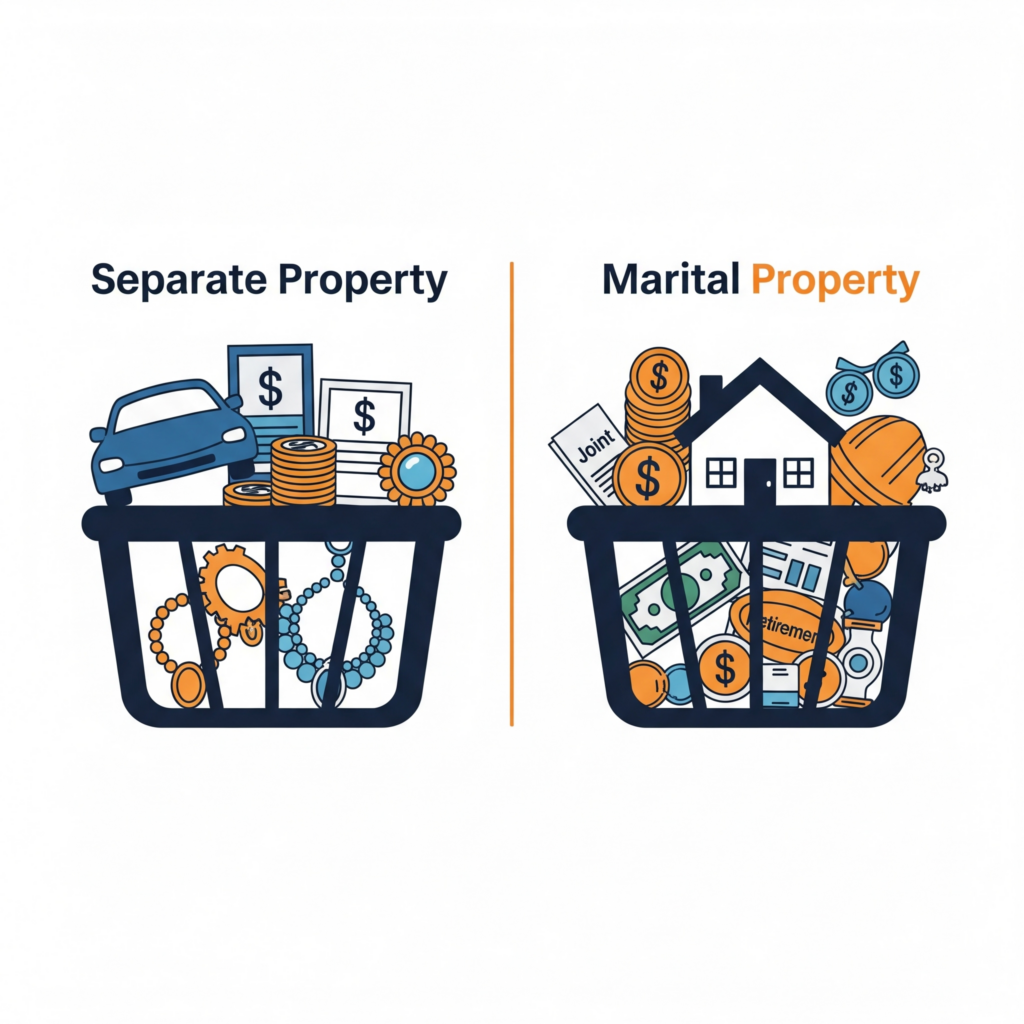Getting divorced can be extremely stressful for most people. If you are going through a divorce or planning to file soon, you might be worried about how your property will be divided, how time with your children will be handled, and whether you’ll have enough money to maintain your lifestyle. Most people who go through a divorce must contend with both financial and emotional conflict because of the end of their marriage and issues about how to divide everything.
If you have been married for some time and share a home with your soon-to-be ex, you might be concerned about what will happen to your marital home and who will get it in your divorce. In many cases, the marital home is the largest asset a couple might own, so the stakes involved in dealing with the home can be fairly high. Here are some things to think about from a divorce lawyer in New Jersey at the New Jersey law firm of Ziegler Law Group, LLC.
Quick Summary
Dividing the marital home in an NJ divorce involves equitable—not equal—distribution. Options include selling and splitting proceeds, one spouse buying out the other, or deferred sale arrangements. Custody, finances, and contributions influence who keeps the house. Legal guidance ensures fair, financially sound outcomes.

New Jersey courts consider whether the home is a marital or separate asset when dividing it.
Understanding Marital Property vs Separate Property
The first thing to understand if you are worried about how your home will be handled in your divorce is the difference between marital and separate property. In New Jersey, courts distinguish between the property either spouse owned before the marriage and the property acquired during the marriage. Only marital property will be included in the marital estate and subject to division amongst the parties. Assets one spouse owned separately before the marriage will typically remain with that spouse. However, if the spouse commingled a separate asset with marital property, it can lose its separate nature and be included in the marital estate.
In most cases, a marital home will be deemed marital property. If you and your spouse purchased your home during your marriage, you’ll need to determine how to handle it in your divorce. If you owned your home before your marriage, it should remain with you. However, if your spouse contributed money to your home through mortgage payments, renovations, repairs, etc., the contributions and the increase in the value of your home could be deemed to be marital property.
Legal Tip
Even if your name isn’t on the deed, marital equity laws may still grant you rights to the home. Consult a New Jersey divorce attorney before finalizing any home agreement.
How is Property Divided in Divorce in NJ?
A small minority of states are community property states for divorce cases. In those states, the marital assets are divided equally between the spouses. However, New Jersey is not a community property state. Like the majority of states, New Jersey follows an equitable distribution rule in divorce cases. In the equitable distribution of marital assets and debts, courts divide assets equitably or fairly. This doesn’t mean that the assets will be divided equally. In many cases, one spouse might receive slightly more than the other spouse because it is just.

Who Gets the House in a Divorce in NJ?
Who Gets the House in a Divorce in NJ?
Many divorces involve substantial conflict over the marital home, often because it’s the most valuable asset that a couple might own. Selling the home and dividing the proceeds might be the easiest way to deal with the home. However, one spouse might be reluctant to do such a thing. When one spouse wants to sell the home, but the other one refuses, the spouse who wants to sell can ask the court to force the sale. However, there isn’t a guarantee that the judge will issue a forced sale order.
If the couple has children, dealing with the home can be even harder. The parent who has primary residential custody might want to remain in the home so the children won’t be uprooted. There are a couple of different ways to best navigate this route, including one spouse buying out the other’s interest, refinancing the mortgage in their name only, or agreeing to continue co-ownership until the youngest child finishes high school. However, these solutions might not be economically feasible for either the custodial parent or the other spouse.
Who Gets The House in a Divorce in NJ? — A downloadable guide from Ziegler Law Group LLC
Download the guide “Who Gets The House In A Divorce?”
Ready to Secure the Home?
Call Ziegler Law Group at (973) 533‑1100 or book your confidential consultation now to understand your rights and options.
Factors Considered in Determining Who Gets The House
If a couple can’t reach an agreement about how to handle the house, the court will decide for them. Judges consider numerous factors when deciding how to divide marital assets and debts, including the marital home. For the home in particular, the court might consider the following factors:
- Whether one spouse is financially dependent on the other spouse
- The contributions the financially independent spouse made to the home
- Whether the financially dependent spouse made contributions by raising children and maintaining the home
- The child custody and visitation agreement
- Whether the couple has minor children
- How well the children are adjusted to their home, school, and community
- Whether the lower-earning spouse will receive alimony and/or child support
- The physical and mental health of each spouse
- The ages of each spouse
If the couple signed a prenuptial or postnuptial agreement that addressed how the home will be handled in a divorce, the court will generally follow what the agreement states. However, if the prenuptial or postnuptial agreement was created under duress, coercion, or when one spouse failed to disclose their finances to the other party, the court might determine the agreement is invalid and disregard it.
What About the Mortgage?
In the event a couple has a mortgage in both of their names, the spouse who remains in the home will typically be required to make the mortgage payments. The other spouse might ask the remaining spouse to refinance the mortgage in their name solely to avoid problems. If the spouses decide to leave the existing joint mortgage as-is, the spouse who moves could run into credit problems. The lender will go after both spouses for payment if the remaining spouse falls behind on the mortgage.
If the remaining spouse fails to keep up with the mortgage payments, it can also hurt the other spouse’s credit. Finally, having the mortgage on their credit could prevent the spouse who left from being approved for a new mortgage because of their debt-to-income ratio. For these reasons, it’s best for the spouse who gets the home to refinance the mortgage. If they can’t afford the payments or can’t be approved for refinancing, the former spouses qill then need to considering selling the home.

Keep your credit secure while working through home division after divorce.
What Are Some Options for a Marital Home?
There are three main ways spouses can address the marital home in a divorce:
1. Sell and divide the proceeds
The couple could choose to place the home for sale and divide the proceeds as a part of the overall property division. This might be the only viable approach if neither spouse can afford the payments on their own or purchase new homes along with the existing mortgage.
2. The remaining spouse buying out the other’s interest
If the spouse who wants to remain in the home can afford it, they can buy out the leaving spouse’s interest in the home. This can be accomplished by the spouse who wants to remain in the home agreeing to take less of the other assets equal to the value of the leaving spouse’s equity interest. However, if the couple doesn’t own the home outright, the spouses will need to deal with the mortgage. The remaining spouse can refinance the mortgage to get a loan in their name alone, but they will need to be approved and make sure they can afford the mortgage payments, insurance, taxes, and upkeep.
3. Continue joint ownership
Some spouses agree to continue jointly owning the home for a predetermined time. For example, the couple might agree to keep the home until the youngest child graduates from high school. If the couple’s split is amicable, they might agree to continue living in the same home in separate areas. In some cases, spouses might agree to take turns staying in the home with the children while maintaining a separate apartment they rotate in and out of. This approach requires flexibility and an amicable relationship between the divorced spouses, and it can also be expensive.
Reasons to Seek Legal Advice When Dealing with Marital Property
Figuring out how to divide the marital home can be challenging for any divorcing couple, even if you and your spouse are amicable in your divorce, deciding what to do with the home can be a complex undertaking. An experienced divorce lawyer in New Jersey at the law firm of Ziegler Law Group, LLC can help you understand the long-term implications of different options and how they might affect your finances.
Your lawyer can also work to secure a fair property settlement agreement that protects your financial interests. When you have an exceptional attorney, they can negotiate with your spouse on your behalf. If your divorce is filled with conflict, it’s important to have an attorney who is willing to stand up for you and protect your rights to receive a fair share of the property.
Consult a NJ Divorce Attorney
If you are preparing to divorce your spouse, you should talk to an experienced divorce lawyer in New Jersey at Ziegler Law Group, LLC. Our attorneys can help you with all aspects of your divorce case, including what to do with your home, how to handle child custody and child support, and whether alimony should be addressed. To learn more about your legal options, contact us today at (973) 533-1100.
For the general public: This Blog/Website is made available by the law firm publisher, Ziegler Law Group LLC for information and educational purposes only. It provides general information and a general understanding of the law but does not provide specific legal advice to any reader. By using this site, commenting on posts, or sending inquiries through the site or contact email, you confirm that there is no attorney-client relationship created between you and the Blog/Website publisher. The Blog/Website should not be used as a substitute for competent legal advice you obtain from a licensed attorney in your jurisdiction.
For attorneys: This Blog/Website is informational in nature and is not a substitute for legal research or a consultation/representation on specific matters pertaining to your clients. Due to the dynamic nature of legal doctrines or the current law what might be upheld or viable one day may be changed or modified the next. As such, all of the content of this entire blog must not be relied upon as a basis for arguments to a court or for specific individualized advice to clients without, again, further research or a formal consultation with our professionals.
Frequently Asked Questions
1. Who gets the house in a New Jersey divorce?
It depends on equitable distribution factors like ownership, contributions, and custody—not just whose name is on the deed.
2. What if only one spouse is on the mortgage or deed?
Even if one spouse is listed, marital equity rights may apply if the home was bought or improved during the marriage.
3. Can we be forced to sell the house?
Yes, if no agreement is reached, a judge may order the sale and equitable division of proceeds.
4. Can I buy out my spouse’s interest?
Yes, if you can refinance or offset the value with other assets, you can retain ownership through a buyout.
5. Will staying in the home affect custody?
It can. Courts often prefer stability for children, which may support the custodial parent remaining in the home.
6. What happens to our mortgage during the divorce?
Both spouses remain liable until it’s refinanced or paid off. Missed payments can harm both credit scores.
7. What if the home is worth less than what we owe?
This situation, known as being “underwater,” may require a short sale or creative distribution to share the financial burden.
8. Do I need a lawyer to divide the house?
Yes. A knowledgeable NJ divorce attorney can protect your equity, guide you through negotiations, and ensure fair treatment.







